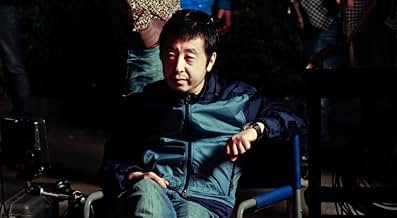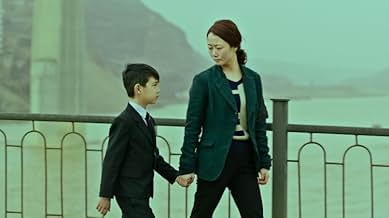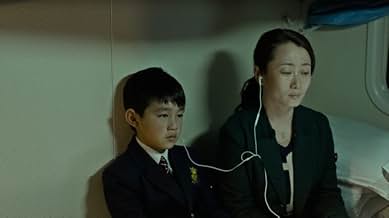IMDb RATING
6.9/10
6.9K
YOUR RATING
The life of Tao, and those close to her, is explored in three different time periods: 1999, 2014, and 2025.The life of Tao, and those close to her, is explored in three different time periods: 1999, 2014, and 2025.The life of Tao, and those close to her, is explored in three different time periods: 1999, 2014, and 2025.
- Awards
- 26 wins & 42 nominations total
Yi Zhang
- Zhang Jinsheng
- (as Zhang Yi)
Zijian Dong
- Zhang Daole aka Dollar
- (as Dong Zijian)
- Director
- Writer
- All cast & crew
- Production, box office & more at IMDbPro
6.96.9K
1
2
3
4
5
6
7
8
9
10
Featured reviews
Like a changing urban landscape, the humans as well!
When everybody around me liked the director's previous film 'A Touch of Sin', I didn't. As a film fanatic, reject such kind of film is not an easy job without giving a proper reason. I thought that was a missed opportunity. I surely like art films, not the boring one like those aimlessly narrated. I really loved some of the scenes there, but here it was completely different. Most importantly, anybody would understand what the film is trying to say without trying too hard.
This is a theme where the China's rise was revealed from the three people's personal life perspective that was categorised to the three generations or the timelines. That's not it, the communism was also highlighted, how it held back the people's freedom. The writer was really smart to smoothly disclosing that to the world. I mean the film never dragged the China's ruling party or its system, but all were told from its character who struggled and if you use your brain, you will get it why.
The narration was divided into three episodes. The first one takes place in the year 1999, in a small town somewhere in the China which is economically backward. The story follows a young woman named Tao, who is caught in a love triangle. But for the practical reason, she has to choose one of them and when she does, the other guy leaves the town with the heartbroken. This is the foundation, that dragged for nearly 40 minutes. Obviously slow, but very realistic approach.
I grew up in the 90s, my country was not much different than what's in this film was shown. So I liked the atmosphere, all those the 90s set, the automobiles, lifestyle, the landscapes of the small towns et cetera taken me back to that time. But the thing is, it was China, society and culturally different. Anyway, it was past and what follows are totally flips the narration, including the perspective.
"You know the hardest thing, about love is caring."
The second episode takes place in the year 2014, which is something like the present. It reveals what's the status of all the main three characters, like where they're economically standing and the personal life struggles. Tao's married life did not go well and her son is around ten years old who visits her from Shanghai. The one who left the town is now returned and battling for his life for some reason.
In the last 15 years, the China significantly changed and still, this entire part is set in the same town which is now economically moved forward. Like the changing urban landscape, how these characters too changed were what focused on this section.
Then comes the final episode where it is now in the year 2025, that takes place somewhere in the Australia. The perspective was changed, the little boy is now in his 20s, seems lost is root. With his behaviour, you would notice that his lack of knowledge about his ancestors. He who has the differences with his father, decides to make his life as he wanted. That is why the parents should take responsibility to teach their children all the good things about their culture and traditions, and to carry on, it's up to them. Because losing one's identity could lead to the failures in the life.
This is the part I liked better. Because it was something like what I encountered in my life. Most of the childhood memories that returns after we're grown-up as the deja vu, like the history repeating itself. Here for pointing out the freedom one to buy a gun was indirectly hit the communism. I mean gun was not a threat, it was just an expressed how it affects people in all the similar circumstances. I meant, what something was hidden brings more eagerness for us to know about it than those are in the out. So forcing something on people is sometime is a bad idea.
All the actors were good, but apart from the slow screenplay, I liked the idea of this film. There are some other similar films, like how different generations behave and now this is among them, yet not the best out of all of them. Very much watchable, only if you are capable of handling slow drag. If you know this director very well or the fan of his works, you will find it a pretty interesting film. I won't recommend it, but I also won't either suggest you to skip it.
7.5/10
This is a theme where the China's rise was revealed from the three people's personal life perspective that was categorised to the three generations or the timelines. That's not it, the communism was also highlighted, how it held back the people's freedom. The writer was really smart to smoothly disclosing that to the world. I mean the film never dragged the China's ruling party or its system, but all were told from its character who struggled and if you use your brain, you will get it why.
The narration was divided into three episodes. The first one takes place in the year 1999, in a small town somewhere in the China which is economically backward. The story follows a young woman named Tao, who is caught in a love triangle. But for the practical reason, she has to choose one of them and when she does, the other guy leaves the town with the heartbroken. This is the foundation, that dragged for nearly 40 minutes. Obviously slow, but very realistic approach.
I grew up in the 90s, my country was not much different than what's in this film was shown. So I liked the atmosphere, all those the 90s set, the automobiles, lifestyle, the landscapes of the small towns et cetera taken me back to that time. But the thing is, it was China, society and culturally different. Anyway, it was past and what follows are totally flips the narration, including the perspective.
"You know the hardest thing, about love is caring."
The second episode takes place in the year 2014, which is something like the present. It reveals what's the status of all the main three characters, like where they're economically standing and the personal life struggles. Tao's married life did not go well and her son is around ten years old who visits her from Shanghai. The one who left the town is now returned and battling for his life for some reason.
In the last 15 years, the China significantly changed and still, this entire part is set in the same town which is now economically moved forward. Like the changing urban landscape, how these characters too changed were what focused on this section.
Then comes the final episode where it is now in the year 2025, that takes place somewhere in the Australia. The perspective was changed, the little boy is now in his 20s, seems lost is root. With his behaviour, you would notice that his lack of knowledge about his ancestors. He who has the differences with his father, decides to make his life as he wanted. That is why the parents should take responsibility to teach their children all the good things about their culture and traditions, and to carry on, it's up to them. Because losing one's identity could lead to the failures in the life.
This is the part I liked better. Because it was something like what I encountered in my life. Most of the childhood memories that returns after we're grown-up as the deja vu, like the history repeating itself. Here for pointing out the freedom one to buy a gun was indirectly hit the communism. I mean gun was not a threat, it was just an expressed how it affects people in all the similar circumstances. I meant, what something was hidden brings more eagerness for us to know about it than those are in the out. So forcing something on people is sometime is a bad idea.
All the actors were good, but apart from the slow screenplay, I liked the idea of this film. There are some other similar films, like how different generations behave and now this is among them, yet not the best out of all of them. Very much watchable, only if you are capable of handling slow drag. If you know this director very well or the fan of his works, you will find it a pretty interesting film. I won't recommend it, but I also won't either suggest you to skip it.
7.5/10
Unique, fascinating Chinese drama.
Mountains May Depart, directed by Zhangke Jia, is a very fine Chinese drama, whose timeline spans some twenty-five years from the past, to the present, to the future, representing China in the modern age and possibly where it's headed. It is something that's quite unique and interesting. Jia was also the director of a movie I saw a few years ago called A Touch of Sin, and while I remember admiring that film (which is of a considerably darker subject matter than this one), it left me feeling a little cold, while I enjoyed the experience of Mountains May Depart more.
The main character in story, who is connected in one way or another to almost every other prominent person, is a woman named Tao Zhao, played by Shen Tao. She is the heart of the film even during much of the parts she's not in, playing it with empathy and truth in her journey, a very fine performance. There are two other good performances by Yi Zhang and Jing Dong Liang, and these three main character evolve significantly through time. But the main strength is a story dealing themes of class and materialism, and the cost of progress, put together in a way worthy of these universal human subjects.
Mountains does have some issues in the final of the three acts as it becomes a little odd--odd in a way that that might have worked with different material, but doesn't quite fit with the rest of this film. Still, this is an overall fascinating and moving experience, well-acted and written, making itself very relatable and is an impressive way to view these people over time.
The main character in story, who is connected in one way or another to almost every other prominent person, is a woman named Tao Zhao, played by Shen Tao. She is the heart of the film even during much of the parts she's not in, playing it with empathy and truth in her journey, a very fine performance. There are two other good performances by Yi Zhang and Jing Dong Liang, and these three main character evolve significantly through time. But the main strength is a story dealing themes of class and materialism, and the cost of progress, put together in a way worthy of these universal human subjects.
Mountains does have some issues in the final of the three acts as it becomes a little odd--odd in a way that that might have worked with different material, but doesn't quite fit with the rest of this film. Still, this is an overall fascinating and moving experience, well-acted and written, making itself very relatable and is an impressive way to view these people over time.
recommended
For the most part, this is a beautifully written movie. The direction and acting are excellent throughout. The writing is too. although the sequence set in Australia is rather unnecessary. I have read reviews saying they found this sequence awkward. it is mostly in English. I didn't find it awkward. It just didn't bring anything to the movie. We could have been spending more time with the wonderful Tao Zhao. As I said all the performances are excellent. But it's her's you will remember, and the film does end perfectly
Two thirds excellent, one third clumsy
Director Zhangke Jia is not afraid to tackle the problems of modern China, and 'Mountains May Depart' is no exception. The film touches upon issues such as growing inequality, poor working conditions and corruption, but the central theme is the price the country is prepared to pay for its obsession with material progress.
The film is set in Fenyang, a northern coal mining city and the director's hometown. In 1999, at the eve of the new millennium, eighteen year old Tao (played by the director's wife Tao Zhao) has to choose between two suitors: the honest but ordinary coal miner Liangzi and the flashy bragger Zhang. She sees right through Zhang's bravado, but can't resist the promise of a better life, symbolized by his red Volkswagen, 'perfect for the next century'. Liangzi feels humiliated and leaves town.
Fifteen years later, Tao is well-off, but divorced and unhappy. Her seven year old son is living the good life with his father in Shanghai. Liangzi, in the mean time, is terribly ill and returns to Fenyang. Filled with remorse, Tao helps him financially but doesn't seem to be able to relate to him on an emotional basis.
Flash-forward another ten years into the future, and Tao's son is living with his father in Australia. He had to leave China, it turns out, because of anti-corruption campaigns. The boy is a spoilt and clueless brat, who refuses to speak Chinese to his father, but finds some emotional warmth with his Chinese teacher.
The first two parts of the film are excellent. Tao's moral choices, the contrast between progress and tradition, the power of money - it's all shown in a beautiful heartfelt way. The director anchors the story with recurring images, like a tall pagoda on the banks of the Yellow River, and spices it with small symbolic items like dumplings and keys. An interesting feature is the changing aspect ratio: in the first episode the screen is almost square, and it widens until it is widescreen in the last episode. Another feature is the way dialogues are filmed: repeatedly the director frames only one participant. And a third peculiarity are some high-impact scenes without a clear meaning or function in the story: a crashing military plane, a coal truck losing some of its cargo, a nervous caged tiger.
The sad thing about this movie is that the third part is very different from the first two parts, and lacks the quality of it. Not only are we introduced to different protagonists, also in this part the dialogue and acting are clumsy and unnatural, the story lacks focus and the scenes seem pointless. It's as if the director loses his golden touch when the story leaves China.
Still, in this last episode, the message is hammered home: the strive for material wealth leads to emotional poverty.
The film is set in Fenyang, a northern coal mining city and the director's hometown. In 1999, at the eve of the new millennium, eighteen year old Tao (played by the director's wife Tao Zhao) has to choose between two suitors: the honest but ordinary coal miner Liangzi and the flashy bragger Zhang. She sees right through Zhang's bravado, but can't resist the promise of a better life, symbolized by his red Volkswagen, 'perfect for the next century'. Liangzi feels humiliated and leaves town.
Fifteen years later, Tao is well-off, but divorced and unhappy. Her seven year old son is living the good life with his father in Shanghai. Liangzi, in the mean time, is terribly ill and returns to Fenyang. Filled with remorse, Tao helps him financially but doesn't seem to be able to relate to him on an emotional basis.
Flash-forward another ten years into the future, and Tao's son is living with his father in Australia. He had to leave China, it turns out, because of anti-corruption campaigns. The boy is a spoilt and clueless brat, who refuses to speak Chinese to his father, but finds some emotional warmth with his Chinese teacher.
The first two parts of the film are excellent. Tao's moral choices, the contrast between progress and tradition, the power of money - it's all shown in a beautiful heartfelt way. The director anchors the story with recurring images, like a tall pagoda on the banks of the Yellow River, and spices it with small symbolic items like dumplings and keys. An interesting feature is the changing aspect ratio: in the first episode the screen is almost square, and it widens until it is widescreen in the last episode. Another feature is the way dialogues are filmed: repeatedly the director frames only one participant. And a third peculiarity are some high-impact scenes without a clear meaning or function in the story: a crashing military plane, a coal truck losing some of its cargo, a nervous caged tiger.
The sad thing about this movie is that the third part is very different from the first two parts, and lacks the quality of it. Not only are we introduced to different protagonists, also in this part the dialogue and acting are clumsy and unnatural, the story lacks focus and the scenes seem pointless. It's as if the director loses his golden touch when the story leaves China.
Still, in this last episode, the message is hammered home: the strive for material wealth leads to emotional poverty.
Both joyous & heart-wrenching, symbolic and founded in human relationships
Read full review here: http://bit.ly/2eo9O3d
Somewhere in Mountains May Depart there's a quote I can't recall that says, effectively, you can't spend your entire life with any one other person. While this may not be categorically true, if you think through the eras of a life - as a baby, toddler, childhood, teenager, young adult, middle-age, and so on - it is unlikely that any one person will be a part of your daily interactions throughout. Considering that, it can be true that the impact someone has on your life may be greater than the portion of time you spend with them. Through a handful of characters whose lives intertwine over three distinct periods of time - 1999, 2014, & 2025 - Chinese-born director Jia Zhangke explores and rejoices in the emotional resonance of our relationships in Mountains May Depart.
The three epochs of the film are each brilliantly conceived aesthetically to provide a subtle atmospheric guide to the scenes they are home to within the story. The boxy, more realistic and grainy style of the 1999 sequence - designed to match actual documentary footage the director and his cinematographer shot from the same period - is a little more raw, like the youthful emotions the characters experience in their mid-20's. Here we have a love triangle where our central character, Tao, is confronted with a choice between the brash, rich, and charming Jinsheng and the humble coal-miner Liangzi. The 2014 section is a wider aspect ratio with a higher quality, yet natural visual reflecting Tao's middle-aged experience. Life's lessons have provided a bit more perspective and the muted colors are like some of her dreams that haven't worked out as planned. She's divorced and facing a continental estrangement from her 7-year old son. A fully widescreen format with an artificial, over-developed HD quality evokes a 2025 that is equally more advanced and more separated from the past. This is the backdrop as Tao's son Dollar has to learn why he feels unsettled in a life he's done little to create for himself. Here, in a bit of an Oedipal twist, he develops a relationship with a surrogate mother of sorts that reminds the youth, now so far removed from his past that he can't even speak his first language, where he came from. For the first time of his own volition he makes the choice to search and reach backwards so that he can progress and grow. It hurts. You don't know if he achieves what he's reaching for but the important thing is that he chooses to do it.
Zhangke uses artifacts from his own life, from pop-culture, and of a more universal nature to serve as totems for emotional relationships that bridge the difference timelines. In 1999 Tao is young and bright, greeting each moment with a smile. She rejoices in music and food that bring her joy. Later in 2014 she faces losing everyone that is or has been important to her and these things become tools for holding on to what she's lost. A divorce left her with lots of money and a lost custody battle for her young son, whose father is abandoning all remnants of their culture and taking him to Australia. After panicking, Tao resolves to make the most impact she can on the impressionable and hungry heart of her little boy. She prepares several tokens for him to keep close through taste, touch, sound and feeling, as they will become further away than ever. The keys she gives Dollar are based on the director's own mother doing the same for him. It's possible she may never know the impact they have in his life but they become figuratively the keys to his unlocking his own freedom (see what I did there??) as he comes of age in 2025. These tokens used throughout the film, and especially two key pieces of music and the light-touch score from Yoshihiro Hanno, immediately have the same effect on the viewer each time they are re-introduced to signify a key relationship and emotion whose origin may be otherwise untraceable to the characters.
Somewhere in Mountains May Depart there's a quote I can't recall that says, effectively, you can't spend your entire life with any one other person. While this may not be categorically true, if you think through the eras of a life - as a baby, toddler, childhood, teenager, young adult, middle-age, and so on - it is unlikely that any one person will be a part of your daily interactions throughout. Considering that, it can be true that the impact someone has on your life may be greater than the portion of time you spend with them. Through a handful of characters whose lives intertwine over three distinct periods of time - 1999, 2014, & 2025 - Chinese-born director Jia Zhangke explores and rejoices in the emotional resonance of our relationships in Mountains May Depart.
The three epochs of the film are each brilliantly conceived aesthetically to provide a subtle atmospheric guide to the scenes they are home to within the story. The boxy, more realistic and grainy style of the 1999 sequence - designed to match actual documentary footage the director and his cinematographer shot from the same period - is a little more raw, like the youthful emotions the characters experience in their mid-20's. Here we have a love triangle where our central character, Tao, is confronted with a choice between the brash, rich, and charming Jinsheng and the humble coal-miner Liangzi. The 2014 section is a wider aspect ratio with a higher quality, yet natural visual reflecting Tao's middle-aged experience. Life's lessons have provided a bit more perspective and the muted colors are like some of her dreams that haven't worked out as planned. She's divorced and facing a continental estrangement from her 7-year old son. A fully widescreen format with an artificial, over-developed HD quality evokes a 2025 that is equally more advanced and more separated from the past. This is the backdrop as Tao's son Dollar has to learn why he feels unsettled in a life he's done little to create for himself. Here, in a bit of an Oedipal twist, he develops a relationship with a surrogate mother of sorts that reminds the youth, now so far removed from his past that he can't even speak his first language, where he came from. For the first time of his own volition he makes the choice to search and reach backwards so that he can progress and grow. It hurts. You don't know if he achieves what he's reaching for but the important thing is that he chooses to do it.
Zhangke uses artifacts from his own life, from pop-culture, and of a more universal nature to serve as totems for emotional relationships that bridge the difference timelines. In 1999 Tao is young and bright, greeting each moment with a smile. She rejoices in music and food that bring her joy. Later in 2014 she faces losing everyone that is or has been important to her and these things become tools for holding on to what she's lost. A divorce left her with lots of money and a lost custody battle for her young son, whose father is abandoning all remnants of their culture and taking him to Australia. After panicking, Tao resolves to make the most impact she can on the impressionable and hungry heart of her little boy. She prepares several tokens for him to keep close through taste, touch, sound and feeling, as they will become further away than ever. The keys she gives Dollar are based on the director's own mother doing the same for him. It's possible she may never know the impact they have in his life but they become figuratively the keys to his unlocking his own freedom (see what I did there??) as he comes of age in 2025. These tokens used throughout the film, and especially two key pieces of music and the light-touch score from Yoshihiro Hanno, immediately have the same effect on the viewer each time they are re-introduced to signify a key relationship and emotion whose origin may be otherwise untraceable to the characters.
Did you know
- TriviaSome sequences (in the 1999 segment) were filmed by the director and the cinematographer back in 2001.
- GoofsThe young boy who plays Tao's son in 2014 is also part of the crowd of children that watches her perform at the new year's celebrations in 1999.
- Crazy creditsThe title appears more than forty minutes after the beginning of the movie.
- SoundtracksGo West
Written by Henri Belolo, Jacques Morali and Victor Willis, Neil Tennant and Chris Lowe
Performed by Pet Shop Boys
- How long is Mountains May Depart?Powered by Alexa
Details
- Release date
- Countries of origin
- Official site
- Languages
- Also known as
- Lejos de ella
- Filming locations
- Fenyang, Shanxi, China(Tao's home town)
- Production companies
- See more company credits at IMDbPro
Box office
- Gross US & Canada
- $82,913
- Opening weekend US & Canada
- $5,550
- Feb 14, 2016
- Gross worldwide
- $5,215,660
- Runtime
- 2h 6m(126 min)
- Color
- Sound mix
Contribute to this page
Suggest an edit or add missing content



























